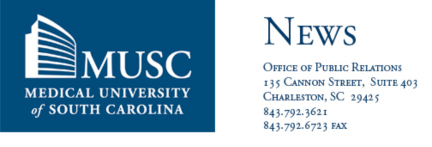
Aug. 16, 2012
CHARLESTON -- Breaking new ground, a Medical University of South Carolina (MUSC) research team has completed the first study to show significant effects of a medication treatment for marijuana cessation in adolescent patients. The antioxidant supplement, used to complement psychosocial behavioral therapy, is available over the counter and has been FDA-approved for other conditions for more than 40 years.
With a reported 25 percent of all high school seniors using marijuana and that number on the rise, addiction specialists and researchers have become increasingly concerned given that adolescents who experiment with marijuana are particularly prone to develop marijuana dependence.
"Prior to this study, research has shown us that while some treatments reduce the amount of marijuana an adolescent uses, marijuana abstinence or cessation rates in adolescent patients are very low," said study lead author, Kevin M. Gray, M.D., Department of Psychiatry and Behavioral Sciences associate professor. "Reduction of use represents progress, but the ultimate goal is cessation."
In the landmark study published in the American Journal of Psychiatry (http://ajp.psychiatryonline.org/article.aspx?articleID=1184217) and funded by the National Institute on Drug Abuse, 116 participants aged 15 to 21 completed a double-blind, randomized and placebo-controlled clinical trial. Along with contingency management behavioral therapy during biweekly intervention visits, participants received either a placebo or a supplement called N-acetylcysteine (NAC). At the conclusion of the study, participants receiving NAC had more than twice the odds, compared with the placebo group, of having negative urinalysis results. In addition, NAC was well tolerated, producing few adverse events.
Evidence suggests that chronic self-administration of drugs alters the neurochemical glutamate in parts of the brain. Work at MUSC by Peter Kalivas, Ph.D., Department of Neurosciences chair and Distinguished University Professor of Neurosciences and Psychiatry and Behavioral Sciences, and colleagues revealed that administration of NAC activates a cysteine-glutamate exchanger, normalizing glutamate levels and reducing drug seeking.
"This trial is an exceptional example of the kind of translational research conducted at MUSC in which innovative findings from a basic science laboratory are rapidly translated into a research study conducted in humans," said Kathleen Brady, M.D., Ph.D., Clinical and Translational Research Center director, Distinguished University Professor and associate dean for clinical and translational research in the Department of Psychiatry and Behavioral Sciences. "Encouragement of this type of investigation is critical to advancing therapeutic development and improving human health."
Although the accessibility and affordability of NAC may lead some to consider it as a stand alone intervention for marijuana dependence, it is important to note that more work needs to be done to clarify its role in the full context of comprehensive treatment. Gray and his colleagues plan future research with adult and adolescent participants, including study of post-treatment follow-ups, varying doses of NAC in different settings and timeframes, and NAC paired with other psychosocial treatments. It is unknown at this time if NAC is an effective marijuana cessation treatment without a psychosocial treatment such as contingency management therapy.
For more information about participating in treatment studies for marijuana or tobacco cessation, call 843-792-4097.
About MUSC
Founded in 1824 in Charleston, The Medical University of South Carolina is the oldest medical school in the South. Today, MUSC continues the tradition of excellence in education, research, and patient care. MUSC educates and trains more than 3,000 students and residents, and has nearly 13,000 employees, including approximately 1,500 faculty members. As the largest non-federal employer in Charleston, the university and its affiliates have collective annual budgets in excess of $1.7 billion. MUSC operates a 700-bed medical center, which includes a nationally recognized Children's Hospital, the Ashley River Tower (cardiovascular, digestive disease, and surgical oncology), and a leading Institute of Psychiatry. For more information on academic information or clinical services, visit www.musc.edu. For more information on hospital patient services, www.muschealth.com.
#####